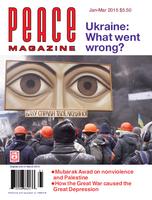
Peace Magazine Jan-Mar 2015, page 5. Some rights reserved.
Search for other articles by peacemag here
Aboriginal peoples are our best hope for correcting environmental concerns, such as Kinder Morgan’s proposed threefold expansion of its oil pipeline through Burnaby Mountain.
Many Canadians justifiably worry about inadequately regulated natural resource extraction and ship- ments. We need for aboriginal protesters to get involved with peaceful demonstrations against the threats to the ecosystem.
Grand Chief Stewart Phillip was arrested in late November at the Burnaby Mountain blockade of the Kinder Morgan project. Furthermore, aboriginal nations from Vancouver Island have recently joined the fight against the Trans Mountain expansion project. They point out that the wave activity resulting from increased oil tanker traffic along the island’s coast will erode sacred midden sites and burial grounds. They point out that the National Energy Board is little more than a politically compromised rubberstamp entity.
Aboriginal nations and activists were emboldened by the June, 2014 Supreme Court of Canada William decision. The ruling recognized the aboriginal title of the Tsilhqot’in nation to 1,750 square km of their land in central British Columbia. Although the ruling does not hand them outright ownership, it does give them the right to use and manage the land and to reap its economic benefits.
The ruling affects all “unceded” territory in Canada —those lands never signed away through a treaty or conquered by war. It means that over an enormous land mass—most of British Columbia, large parts of Quebec and Atlantic Canada, and a number of other spots—a new legal landscape is emerging that offers the prospect of much more responsible land stewardship.
Provincial and federal governments in Canada risk incurring shame in the worldwide news media spotlight as they disregard aboriginal nations’ merited distrust of the environmental risk review and assessment entities.
Frank Sterle, Jr.
White Rock, B.C.
Kazakhstan, the world’s largest landlocked country and ninth largest in the world (Canada is second) with the second coldest capital, Astana (Ottawa is third), is the host for this meeting of the International Physicians for the Prevention of Nuclear War. Two years ago we were in Hiroshima and this year we’re where the Soviets tested over 450 nuclear weapons and affected 1.5 million people with fallout radiation.
When Kazakhstan became independent in 1991, they gave the Russians back over 1,000 nuclear bombs, closed the test site, and have advocated for no more testing. They want a seat on the UN Security Council in 2017-18 and will push for eliminating nuclear weapons. We in Canada, Australia, and Germany are showing the nuclear fuel chain: the connection of uranium mining to refining and enrichment for nuclear power, to plutonium and tritium used in nuclear weapons, and to the waste product depleted uranium.
We in Physicians for Global Survival will hold a Uranium Congress April 14-16 in Quebec City to push for a ban on uranium mining in Quebec.
Richard Denton, M.D.
Astana, Kazakhstan

Peace Magazine Jan-Mar 2015, page 5. Some rights reserved.
Search for other articles by peacemag here